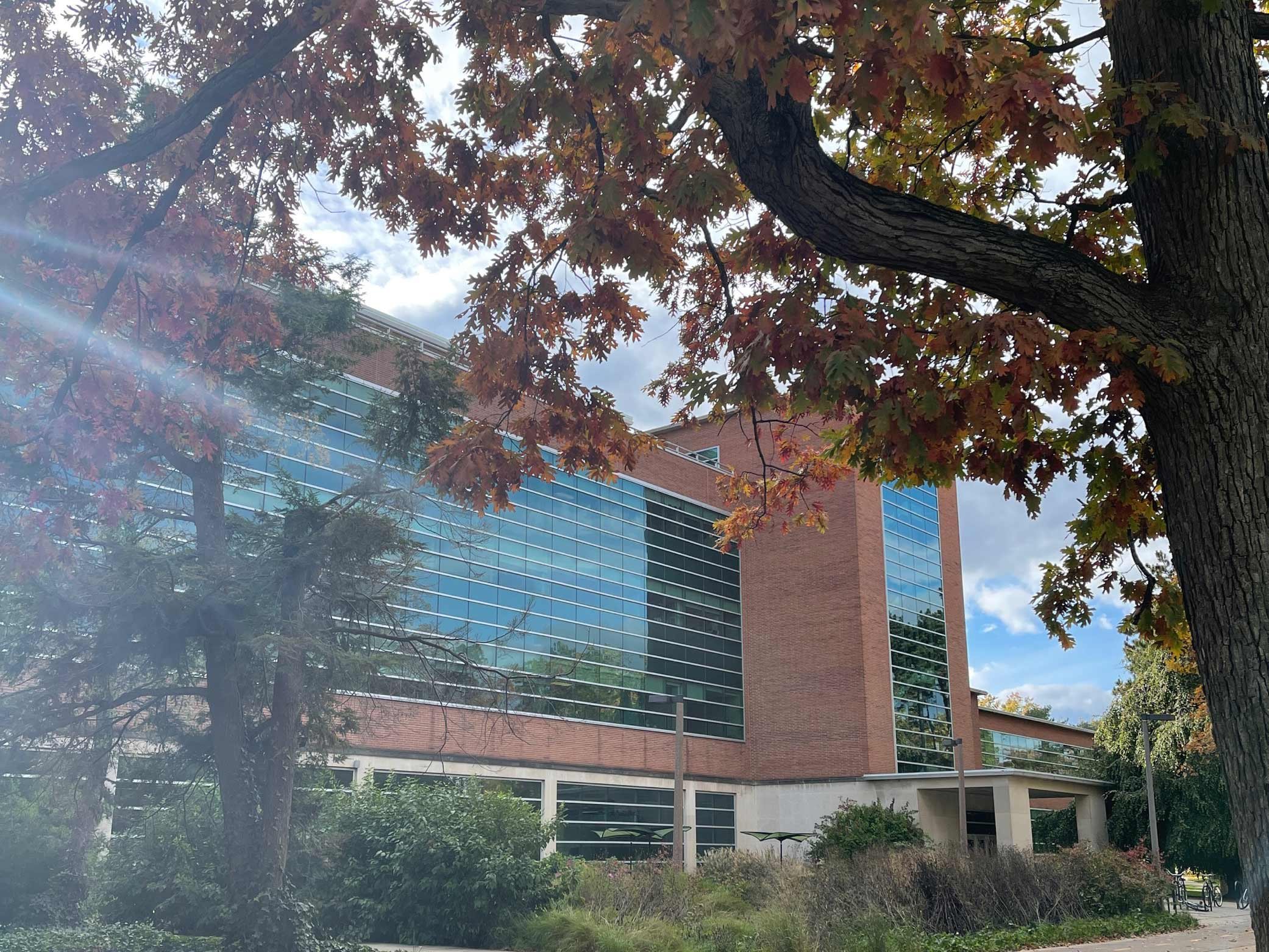Review commonly asked — and answered — questions below. Do you have further questions? Contact a member of our team.
For admissions and application process information, visit: HALE MA Apply.
The Higher, Adult, & Lifelong Education (HALE) M.A. program is a 30-credit hour, 100% online program that promotes professional development among those currently or aspiring to work in higher, adult, and lifelong education in a variety of local, national, and international settings, including colleges and universities, public and nonprofit agencies, as well as private industry. Prospective students must have at least 2-3 years of professional work experience.
The Student Affairs Administration (SAA) M.A. program is a 36-credit hour, cohort-based, in-person program preparing graduate students with the knowledge and skills to work with students in postsecondary education and to cultivate educational environments promoting diversity and multiculturalism. Prospective students are not required to have professional work experience.
Students come to the HALE M.A. program from across the U.S. and around the globe.
Our students:
- are enrolled part-time because they work full-time in a variety of local, national, and international settings, including colleges and universities, public and nonprofit agencies, as well as private industry.
- share in common the experience and desire to teach and lead adult learners in and outside higher education.
Over the years, our program has enrolled professionals in higher education, student affairs administration, adult education administration, healthcare, community organizing, military branches, for-profit businesses, tech industries, and the visual and performing arts.
We are proud of this rich and diverse community of professionals dedicated to lifelong learning.
The program is self-paced, so your completion timeline depends on how many courses you take each semester. The HALE M.A. is a 30-credit program, composed of ten (10) 3-credit courses.
Most students complete their degrees in about two (2) years, but you have up to five (5) years.
No. You will not need to be available at specific times. All online courses are asynchronous, so you can work on your own schedule. There will be plenty of opportunities to connect with your instructors, faculty advisor, and fellow students virtually.
HALE faculty are nationally and internationally recognized scholars.
Information about each faculty member can be found via the CED People Directory, the CHAE website, as well as the MSU Directory.
The broad areas of faculty expertise within the HALE MA program include organization and governance, academic labor, financial aid policy, college access, international and comparative higher education issues, globalization of higher education policy, temporality and embodiment in higher education, cultural studies, de/anti/postcolonial theory, adult and continuing education, transformative learning in cross-cultural settings, institutional environments, college students with disabilities, and college experience and outcomes.
Contact information for faculty can be found via the CED People Directory, the CHAE website, as well as the MSU Directory.
To speak with current student ambassadors, reach out to an advisor for information.
Additionally, prospective and admitted students are invited to the Graduate Research Colloquium (GRC) in the spring to meet with faculty, current students, and newly admitted students.
No. The HALE MA program is a designated 100% online program, students are not able to take any in-person courses at MSU.
Use MSU’s Tuition and Fees Calculator to estimate tuition and student fees. When using the calculator, select “In-State” for Residency, “Masters” for Level, “College of Education” for College and “Online MA/MS Education Programs” for Special Program Type. Most HALE students take one 3-credit course per semester. You can find more information about tuition via MSU’s Office of the Controller website, under Online Education Masters.
The College of Education’s Academic & Student Affairs Office has compiled information about scholarships on its website.
Graduate financial aid advisors can be reached at ofagrad@msu.edu and through MSU’s Office of Financial Aid website. This office is typically quite busy at the beginning of a semester.
No. HALE MA students generally do not hold graduate assistantships, as they are typically full-time employees completing their degree part-time.
However, HALE MA students are eligible for College of Education scholarships. Information about these scholarship opportunities are periodically shared with students via email.
HALE MA students are eligible for up to $500/year in departmental funding for conference attendance, click here for more information (Google Drive).
Additionally, HALE MA students can apply for conference awards ($300) and professional development ($500) funding through the Council of Graduate Students, click here for more information. All questions regarding COGS funding should be directed to office@cogs.msu.edu.
Yes. For course transfer policies, review the program handbook.
Yes. MSU degree programs/certificates require letters of recommendation/reference as part of an application for admission. At least one letter should be from a faculty member who can speak to your skills as a student. For many applicants, we are cognizant that you may be returning to graduate school after some time. You may ask any faculty member or a professional reference who can speak to your academic skills and ability to be successful in graduate-level work.
Yes. MSU degree programs/certificates require a resume or curriculum vitae as part of an application for admission.
Yes. The Graduate School requires a minimum 3.0 GPA (from applicants’ undergraduate/bachelor’s degree program) for admission to graduate-level programs at MSU. However, applicants with a GPA lower than 3.0 may be considered for provisional admission. Please review the program’s specific GPA requirements found on programs’ respective admissions webpages for more detailed information.
Yes. A paid application fee or waiver is required for application review. The HALE MA program does offer fee waivers when prospective applicants attend an open house. MSU’s Graduate School also has a few options. Check your eligibility for an application fee waiver on the Graduate School website or otherwise pay the required application fee.
Yes. Prospective international students should review the Graduate School International Applicants webpage for a list of requirements for international applicants. Note that additional resources, support, and general information can also be found on the Office for International Students and Scholars website.
- Passport Information: N/A
- English Language Competency: International applicants may be required to submit proof of English Language Competency. Those international applicants who may be eligible for a waiver of the English Language Competency policy should review the Procedure to Request a Waiver for English Language Competency.
- Affidavit of Support: International applicants must provide financial proof in order to comply with U.S. Government regulations. The Graduate School provides an Affidavit of Support form and information under the “Financial Proof” drop-down. Applicants do not need to upload this information to the Graduate Application portal for their applications to be reviewed by the faculty for admission recommendation decisions. International students recommended for admission will need to submit an Affidavit of Support before MSU can officially admit them.
Each student has a NetID which serves as their electronic identity at MSU. New students must set up their NetID and password to get access to their MSU email, to access student information, to register for classes, to access the MSU Library, etc. Visit the MSU NetID website and follow the directions to activate your NetID and password.
Yes. Your MSU email address is the only email address the university will use to send official communication to students. You may auto-forward all incoming emails to another account if you choose.
Log into the MSU Student Information System to register for classes. You can also check your account for registration holds and access your enrollment information. You can access information on enrollment and registration from the Enrollment & Registration page of the Office of the Registrar website.
Generally, HALE M.A. students should consider first enrolling in core courses:
- EAD 868 (offered in the fall semester)
- EAD 840 (offered in the spring semester).
It is best that HALE MA students review the HALE MA Requirements and discuss their schedule with their faculty advisor.
D2L is a web-based learning management system (LMS) used for instructor/student communication, assignment submissions, supplemental instruction, and online synchronous/asynchronous instruction. To access d2l.msu.edu you must be a registered MSU faculty, staff, or student and have a valid MSU NetID. For student and instructor resources, visit the MSU D2L help page.
MSU students, faculty, and staff have access to a free, executive Zoom account.
- Use your NetID and password to log into MSU Wi-Fi when on-campus.
- Your laptops, tablets, mobile devices and other Wi-Fi connected devices must be registered with MSU to be able to access Wi-Fi on-campus.
- MSU uses Microsoft 365 tools for email and file sharing.
- Find resources and information on the Technology at MSU website.
You can access this information through the MSU Student Information System. Visit the Office of the Registrar FAQ website for helpful resources.
New HALE M.A. students are informed of their assigned faculty advisor before the beginning of their first semester.
Advising assignments are made by the HALE M.A. Program Director (Dr. Riyad Shahjahan, shahja95@msu.edu) in consultation with the HALE M.A. faculty.
Your faculty advisor’s main role is to help you meet your educational goals as a HALE M.A. student, starting with your coursework and continuing through your Final Essay. The HALE faculty follow the faculty advising recommendations provided in the MSU Graduate School's Guidelines for Graduate Student Advising and Mentoring Relationships. Over the course of your time in the program, you and your faculty advisor will develop the collegial relationship necessary to keep you on track to earning your M.A. degree.
You should plan to meet with your faculty advisor at least once each semester to establish student/advisor expectations, review the HALE M.A. Checklist, develop your HALE Master’s Degree Program Plan, and help answer any questions you have about the program. You are required to meet with your faculty advisor each spring semester to discuss your Annual Progress to Degree Form.
Yes. The faculty advisor assigned to you as you begin your academic journey with HALE is not necessarily permanent. As you get to know the program faculty, you may find that your goals are better aligned with a faculty member other than your assigned faculty advisor. Changing faculty advisors is a common practice and HALE faculty are very supportive of these transitions. Graduate education is a personal journey for every student, and your advising relationship should align with your goals and objectives.
To change your faculty advisor, you need to complete the Changes in Faculty Advisor Master’s Degree Programs form. This form requires signatures from both the faculty advisor you are switching from and the faculty advisor you are switching to, along with your own signature. Once completed, the form needs to be submitted to the HALE Program Assistant (haleadm@msu).
Michigan State University requires that all graduate students be trained in the responsible conduct of research as part of their educational experience. An explanation of the RCRSCA and how to complete it for the HALE M.A. program is in the Responsible Conduct of Research section of the Handbook & Forms section of the website. If you have additional questions, please contact your faculty advisor.
Directions and information about completing the Final Essay are located under HALE M.A. Requirements.
You should also consult your faculty advisor regarding the Final Essay.
MSU student ID cards can be obtained via the MSU ID Office located in the International Center. Visit the MSU ID Office website for current hours of operation as well as policies, procedures, and updates for ordering your MSU ID card. For more information and updates, visit the MSU ID Office website or contact them by phone at 517-355-4500 or by email.
Typically reading assignments in the HALE M.A. program will be journal articles and books. Most journal articles and eBooks can be accessed via the MSU library.




